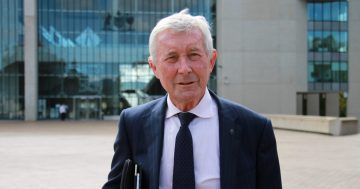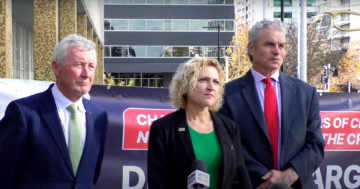
Witness J, or ‘Alan Johns’, was secretly charged and jailed. Photo: Supplied.
The heavily redacted sentencing decision for a man who was charged, sentenced and jailed in secret has finally been released, with the ACT’s chief justice remarking that “secrecy is anathema to the rule of law”.
Witness J, who has the pseudonym ‘Alan Johns’, was a Commonwealth official who admitted breaching secrecy provisions in legal proceedings held entirely in closed court.
While this took place in 2019, the sentencing decision by the ACT Supreme Court’s Justice John Burns was only released on Wednesday (19 April), partly due to lengthy discussions on how to publish it.
However, it is heavily redacted. For instance, when the charges are listed, one reads: “Charge 1 is a charge [REDACTED] alleging [REDACTED] you communicated information [REDACTED] and the communication was not made in circumstances as permitted [REDACTED]”.
Other paragraphs have simply been completely replaced with “[REDACTED]”. It means that while the decision has been released, much of the case remains secret.
Justice Burns said Witness J was trusted with highly classified information on behalf of the Australian people for his job and his security clearance was being reviewed at the time of his offending.
Witness J pleaded guilty to five charges, the first related to two breaches that Justice Burns said involved a “clear risk” that sensitive material could be disseminated with “potentially significant consequences”.
The motive for the first charge “appears to have been to vent your anger over what you considered to be unfair treatment”, he said.
The fifth charge relates to allegations that Witness J communicated information and the communication was not permitted, although the exact details of this crime are also redacted.
“Your purpose in doing so could only have been to remind those that you were dealing with that you could hurt [REDACTED] Australia’s security interests by disclosing the material in your possession,” Justice Burns said.
The justice said the court may never know if the “obvious potential risks” from his offending had “come to fruition”.
He accepted while Witness J’s conduct was not malicious, it posed “real risks for national security as well as for individuals” and some of the risks to the latter “had the potential to be quite grave”.
“You were grossly reckless in your conduct because of your anger towards what you perceived to be unfair and discriminatory treatment of you,” he said.
There was no evidence Witness J had tried to pass on confidential information to third parties.
Justice Burns accepted his time in custody had been considerably more difficult than for most remandees as he had to use an alias and was not allowed to tell anyone except his brother and uncle that he was even in jail.
“Even your mother has not been told,” he said.
He was sentenced to two years and seven months’ jail and spent 15 months in the Alexander Maconochie Centre before being released.
When discussing the release of the decision, ACT Chief Justice Lucy McCallum said it was “extraordinary” to hold proceedings in closed court, but this was done as it was seen as the only way to address concerns over the national security information in the case.
While Justice Burns did contemplate releasing a version of his decision, there was a discussion between his chambers, Witness J and the Commonwealth Attorney-General about redactions and the form in which it could be published was not settled before he retired.
The issue went unresolved until it was brought before Chief Justice McCallum.
She said the prospect of someone being jailed in closed proceedings featuring “secret evidence” was “likely to cause consternation”.
“The administration of justice thrives on the discipline that comes with public scrutiny. That is the premise of the principle of open justice,” she said.
However, she also said some limitation of the principle was sometimes necessary for the proper administration of justice.
She said in this case, after considering the evidence from the Attorney-General, she was in “no doubt” that “the principle of open justice must give way to the interests of national security” and released Justice Burns’ decision in its redacted form.
In 2021, the Independent National Security Legislation Monitor Grant Donaldson held a public hearing as part of his review into how section 22 of the National Security Information Act was used in the secretive case.
“Today’s publication of the Witness J sentencing remarks brings an end to an alarming five-year long saga that should never have happened,” Human Rights Law Centre senior lawyer Kieran Pender said.
“It is a testament to the media, civil society and the Independent National Security Legislation Monitor that this secret trial was identified, called out and now addressed.
“The government must change the law, pursuant to the monitor’s recommendations, to ensure this can never happen again.”
Attorney-General Mark Dreyfus said the former government had agreed to “an unprecedented level of secrecy” in the prosecution of Witness J, which was “not consistent with the rule of law and open justice”.















